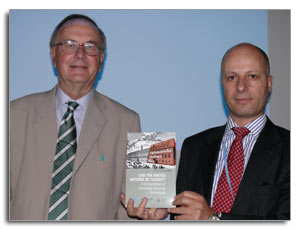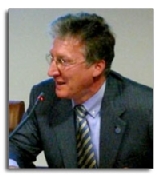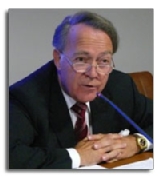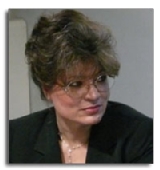Book Launch
8 October 2009, UNIS Multimedia Room, Vienna International Centre (VIC)
 Innovative teaching techniques about the UN system were the focus of a book launch on Thursday, 8 October 2009, at the Vienna International Centre (VIC), organized by the United Nations Information Service (UNIS) Vienna in cooperation with the Diplomatic Academy Vienna and the Vienna Office of the Academic Council on the United Nations (ACUNS).
Innovative teaching techniques about the UN system were the focus of a book launch on Thursday, 8 October 2009, at the Vienna International Centre (VIC), organized by the United Nations Information Service (UNIS) Vienna in cooperation with the Diplomatic Academy Vienna and the Vienna Office of the Academic Council on the United Nations (ACUNS).
The provocatively titled publication "Can the United Nations be Taught?" - a compilation of the proceedings of a Colloquium on Innovative Approaches to Teaching about the United Nations held on 22-23 November 2008 in the Diplomatic Academy of Vienna - comprises over forty contributions of senior UN officials, well known academics and students from Central, Eastern and South-Eastern Europe, as well as Australia and the United States.
The compendium explores possibilities on how the United Nations as a subject can best be addressed in the field of higher education. It discusses innovative teaching initiatives (active learning techniques, simulations, computer based learning), addresses the complexity of teaching and the intricacies of the learning process.
Maher Nasser, UNIS Vienna Director, and author of "Computer-based Materials Useful for Edcuation or Training on the United Nations" opened and moderated the book launch. He presented the recently launched online resource for secondary school teachers "Together Strong", which provides ready-made lesson plans and teaching materials (including a quiz, fact sheets and handouts) in German. The age-appropriate material corresponds to the Austrian curriculum and can be downloaded at the UNIS Vienna website.
 Thomas Stelzer, Assistant Secretary-General for Policy Coordination and Inter-Agency Affairs, UNDESA, and author of "How Can the Academic World Support the Work of the UN System?" attached great importance to a more sustainable cooperative relationship with academia. He pointed to the recently developed paper of the UN Department of Public Information, the
"Academic Impact" initiative, which aims to strengthen links with the academic community. "The United Nations has to go beyond its 'convening forum' in order to harness creative ideas and intellectual thought to address the larger purposes of the organization", said Stelzer. The "Academic Impact" is a global initiative that aligns institutions of higher education with the United Nations, and a mechanism to commit themselves to the fundamental precepts driving the United Nations mandate: to realize the Millennium Development Goals; to serve as a viable point of contact for ideas and proposals relevant to the United Nations mandate; and to engage institutions of higher education in programmes, projects, and initiatives relevant to its mandate.
Thomas Stelzer, Assistant Secretary-General for Policy Coordination and Inter-Agency Affairs, UNDESA, and author of "How Can the Academic World Support the Work of the UN System?" attached great importance to a more sustainable cooperative relationship with academia. He pointed to the recently developed paper of the UN Department of Public Information, the
"Academic Impact" initiative, which aims to strengthen links with the academic community. "The United Nations has to go beyond its 'convening forum' in order to harness creative ideas and intellectual thought to address the larger purposes of the organization", said Stelzer. The "Academic Impact" is a global initiative that aligns institutions of higher education with the United Nations, and a mechanism to commit themselves to the fundamental precepts driving the United Nations mandate: to realize the Millennium Development Goals; to serve as a viable point of contact for ideas and proposals relevant to the United Nations mandate; and to engage institutions of higher education in programmes, projects, and initiatives relevant to its mandate.
 Deputy Director of the Diplomatic Academy of Vienna, and one of the facilitators of the publication, Gerhard Reiweger, referred to the complexity of the teaching challenge and the practical use of learning as a central focus of an academic approach. "The Diplomatic Academy of Vienna has a long tradition of teaching the UN and a history of innovative teaching. Learner-centred teaching methods such as interactive seminars and simulation games have been part of the curriculum since the reestablishment of the Academy in the 1960s (...) since then, many generations of students have been introduced to the complex system of the United Nations and have acquired practical insights and a critical perspective through a methodology of 'learning by doing'", he said. The host of the Colloquium furthermore stressed the importance of teaching technologies, and welcomed the possibility of stocktaking and a critical comparison of best practices, in particular in the new fields of IT-supported teaching.
Deputy Director of the Diplomatic Academy of Vienna, and one of the facilitators of the publication, Gerhard Reiweger, referred to the complexity of the teaching challenge and the practical use of learning as a central focus of an academic approach. "The Diplomatic Academy of Vienna has a long tradition of teaching the UN and a history of innovative teaching. Learner-centred teaching methods such as interactive seminars and simulation games have been part of the curriculum since the reestablishment of the Academy in the 1960s (...) since then, many generations of students have been introduced to the complex system of the United Nations and have acquired practical insights and a critical perspective through a methodology of 'learning by doing'", he said. The host of the Colloquium furthermore stressed the importance of teaching technologies, and welcomed the possibility of stocktaking and a critical comparison of best practices, in particular in the new fields of IT-supported teaching.
Michael Platzer, Vienna Liaison Officer of the Academic Council on the United Nations (ACUNS) and initiator of the Colloquium and publication, highlighted the many successful interactive techniques employed within the UN studies ambit, and embraced the opportunity to expand the network of persons and institutions interested in United Nations education. "This compendium of innovative teaching techniques will hopefully stimulate others to submit their experiences to the Academic Council on the United Nations and the United Nations Studies Association*" he said.
 Axel Wuestenhagen, former Director of the United Nations Information Centre (UNIC) Bonn and the United Nations Information Service (UNIS) Vienna, emphasized the necessity to reach out to young people, academia and teaching professions. Conclusions he draw from his study "Teaching about the United Nations at Austrian Universities and Post-Graduate Institutions", which was mandated by UNIS Vienna and conducted during the summer term 2006 and winter term 2006/2007. The research project identified courses offered by Austrian universities and post-graduate institutions which deal with the United Nations system and/or relevant international issues that are of major concern to the international community.
Axel Wuestenhagen, former Director of the United Nations Information Centre (UNIC) Bonn and the United Nations Information Service (UNIS) Vienna, emphasized the necessity to reach out to young people, academia and teaching professions. Conclusions he draw from his study "Teaching about the United Nations at Austrian Universities and Post-Graduate Institutions", which was mandated by UNIS Vienna and conducted during the summer term 2006 and winter term 2006/2007. The research project identified courses offered by Austrian universities and post-graduate institutions which deal with the United Nations system and/or relevant international issues that are of major concern to the international community.
Miroslav Polzer, Director of the Austrian Science and Research Liaison Office (ASO) Ljubljana, pointed to the importance of increased participation of the United Nations in academic discussions, especially on issues of international and global dimension. "The United Nations system is the central institutional framework for global governance responses to global challenges. It is thus important for all countries of the world to develop knowledge, especially in the academic community, regarding the functioning of the United Nations system", he said. Global challenges, such as climate change, peace and security, human rights, have assumed growing importance on the national political agenda and in everyday life. "The 'Academic Impact' initiative of the UN Department of Public Information" offers a great opportunity to meet those challenges more fully", he furthermore stated.
 Romana Benisch, Knowledge Management Researcher, and author of "How to Create a Knowledge-Sharing Culture in International Organizations" highlighted the importance of knowledge sharing rather than knowledge management: "With pro-active participation in the daily work progress, people become co-creators of a knowledge-sharing culture within and across organizations (...) integrating people into a system is the foundation for an open environment of trust and the only effective method of transforming a static entity into a learning, thus living, organism", she said.
Romana Benisch, Knowledge Management Researcher, and author of "How to Create a Knowledge-Sharing Culture in International Organizations" highlighted the importance of knowledge sharing rather than knowledge management: "With pro-active participation in the daily work progress, people become co-creators of a knowledge-sharing culture within and across organizations (...) integrating people into a system is the foundation for an open environment of trust and the only effective method of transforming a static entity into a learning, thus living, organism", she said.
Senior diplomats, civil society representatives, government officials and staff of the Vienna-based international organizations engaged in a lively discussion with the speakers and authors.
Copies of the compendium can be obtained from the Diplomatic Academy of Vienna or downloaded at http://aso.zsi.at/sl/publikation/3331.html?_lang=en
Invitation (PDF)